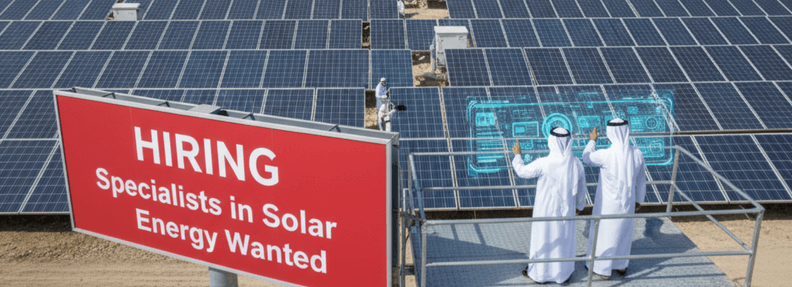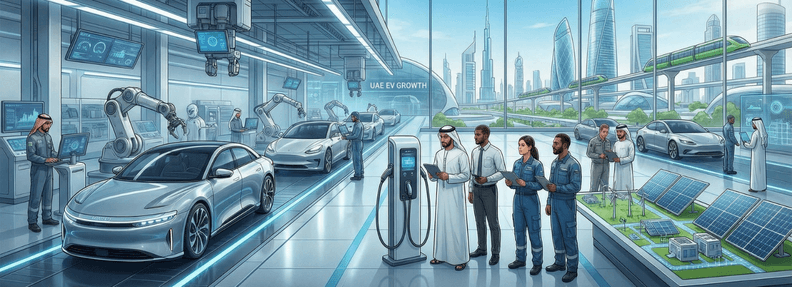
Qatar's 2,000 MW Dukhan solar plant: Building the renewable energy workforce
Qatar is building one of the world's largest solar power plants. QatarEnergy signed an agreement with Samsung C&T for the construction of the Dukhan solar power plant, which will reach a total electricity generation capacity of 2,000 megawatts by mid-2029(1). Developed in two phases about 80 kilometers west of Doha, this plant will double Qatar's solar power production capacity once completed(1).
Table of contents
- Qatar's ambitious solar energy expansion
- Local expertise takes center stage
- The transition opportunity for energy professionals
- Qatar's global solar presence growing rapidly
- Building skills for tomorrow's energy sector
Qatar's ambitious solar energy expansion
In April 2025, the Amir inaugurated the Ras Laffan and Mesaieed solar PV power plants with a combined capacity of 875 MW, more than doubling Qatar's solar energy production to 1,675 MW(2). These projects represent concrete steps toward achieving one of the goals of QatarEnergy's sustainability strategy: generating more than 4,000 megawatts of renewable energy by 2030(2).
Minister Al-Kaabi emphasized that these solar power plants constitute an important step towards achieving the fourth pillar of Qatar national vision 2030, which is managing the environment in a manner that balances economic and social development and environmental protection(2).
Local expertise takes center stage
What makes Qatar's solar expansion particularly significant for professionals is the government's commitment to local talent. Minister Al-Kaabi stated clearly: "We have moved beyond relying on the expertise of others for the construction, operation, and maintenance of solar power plants, and have begun implementing such projects using our own national expertise. We are proud of them and their achievements"(2).
The environmental impact is substantial. When the Dukhan solar power plant is completed, along with Al-Kharsaah, Mesaieed, and Ras Laffan solar power plants, they will help reduce carbon dioxide emissions by about 4.7 million tons annually, while contributing up to 30% of Qatar's total peak electricity demand (1).
This scale of development requires significant workforce capacity. The partnership with Samsung C&T facilitates knowledge transfer while ensuring Qatari nationals gain the expertise needed for future project independence. The government's emphasis on national talent development signals strong career prospects in the renewable energy sector.
The transition opportunity for energy professionals
Qatar's energy sector continues producing talented graduates. QatarEnergy recently celebrated the graduation of Qatari nationals who completed academic studies and vocational programs, joining QatarEnergy and other energy sector companies including QatarEnergy LNG, QAFCO, Shell Qatar, North Oil Company, Woqod, Q-Chem, ORYX GTL, QAFAC, QAPCO, Qatalum, and Qatar Steel (3).
While many current graduates have expertise in traditional energy sectors, the landscape is evolving naturally. As solar projects scale to thousands of megawatts, the demand for renewable energy skills will grow substantially. This presents a transition opportunity rather than a disruption.
Energy professionals possess transferable skills—project management, operations, maintenance, safety protocols, and technical understanding—that apply across both traditional and renewable sectors. The core competencies remain valuable; what shifts is their application. Those who upskill in renewable technologies position themselves advantageously as the sector expands.
The government's commitment to using national expertise ensures that Qatari professionals will be the primary beneficiaries of this transition. As Minister Al-Kaabi noted, "You are embarking on joining a major phase in the history of QatarEnergy and the Qatari energy sector, in which Qatar is taking leadership positions"(3).
Qatar's global solar presence growing rapidly
Qatar's renewable energy ambitions extend beyond national borders. In October 2024, QatarEnergy signed a partnership agreement with TotalEnergies for a solar power project in Iraq, acquiring a 50% interest in a solar photovoltaic project capable of supplying up to 1.25 gigawatts of solar-generated power(4). The project will provide electricity to about 350,000 homes in the Basra region, with phases coming online between 2025 and 2027(4).
As Qatar develops solar expertise domestically and invests in international projects, possibilities emerge for Qatari professionals to contribute to global renewable energy initiatives. The expertise built locally through projects like Dukhan could prove valuable in Qatar's expanding international solar portfolio.
Building skills for tomorrow's energy sector
The timeline is clear: with the Dukhan plant reaching full capacity by 2029 and Qatar targeting over 4,000 MW of renewable energy by 2030, the next five years represent a critical period for skill development. Early movers who gain expertise now will hold competitive advantages as the sector matures.
The reassurance for energy professionals is strong government backing. Qatar isn't abandoning traditional energy—it's diversifying intelligently. The same national talent that built Qatar's position in oil and gas can drive its renewable energy leadership. The skills transfer naturally; what's required is openness to evolution and willingness to upskill.
For those currently in the energy sector or considering it, the message is encouraging: Qatar's renewable energy expansion creates pathways for career growth with clear government commitment to national talent development.



